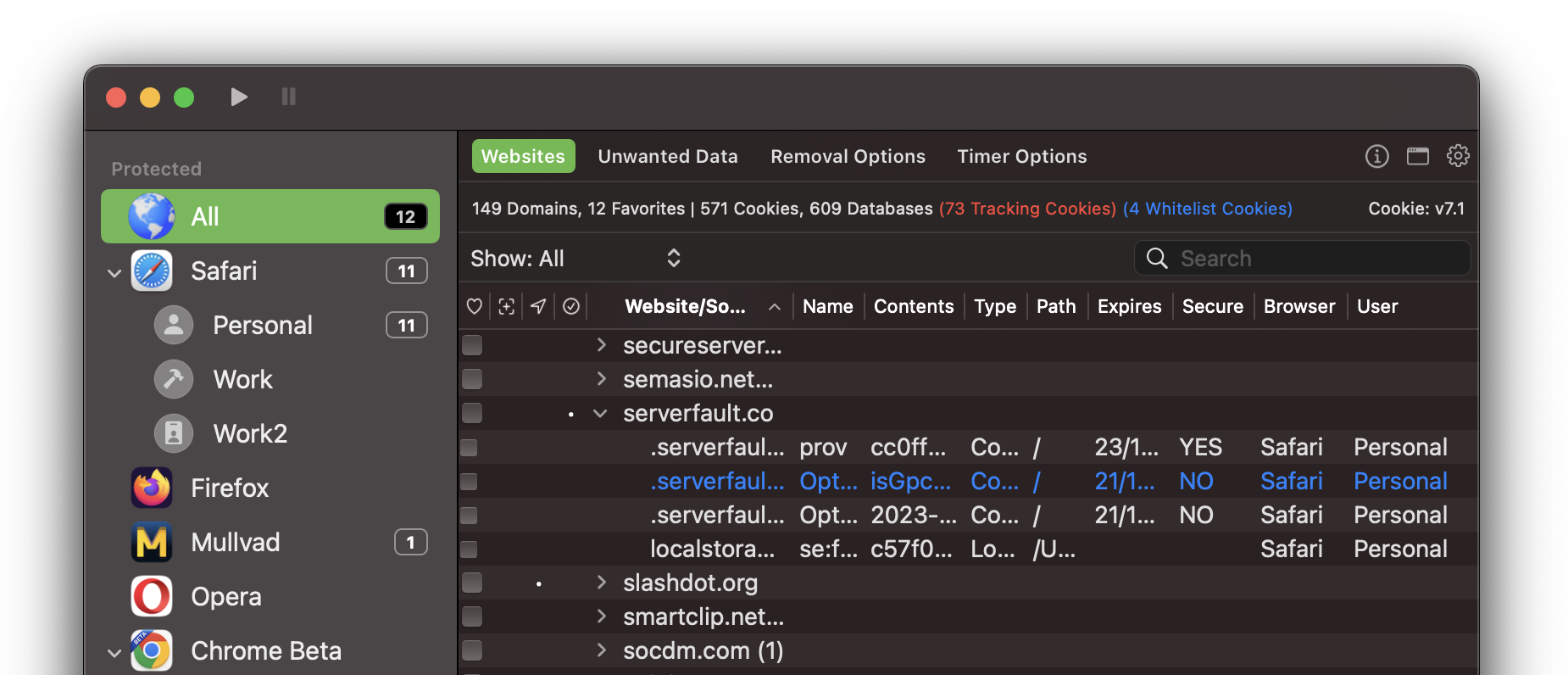Cookie 6 Protect Your Online Privacy V6 0 4

Cookie 6 – Protect your online privacy. October 15, 2019; Utilities; Cookie 6 – Protect your online privacy. AppStore QR-Code Cookie. Developer: SweetP Productions, Inc. Description Overview. Cookie prevents third parties from hijacking your browsing experience. The sites you visit store “cookies” in. The VMworld site is temporarily inaccessible for planned maintenance until 8:00 PM PDT. Please come back after this time. We apologize for the inconvenience. Even cookies which customise a website (such as providing a greeting message) are deemed to be non essential. Essential cookies are generally those which enable an online checkout process to work properly - or if required for technical or security purposes. Failure to comply with the Cookie Law can lead to fines of up to £500,000. Before you enter personally identifying information like your name, email address, credit card info, and other similar sensitive information, check to see if the website has a privacy policy page. If it is missing a privacy page, leave the site and find a similar site or service that has a policy protecting your. Create your privacy and cookie policy in minutes. Customizable from 1300+ clauses, available in 8 languages and automatically updated if the law changes, our generator allows you to create a legal document in minutes and seamlessly integrate it with your website or app.
- Cookie 6 Protect Your Online Privacy V6 0 4 Months
- Cookie 6 Protect Your Online Privacy V6 0 4 X 4
- Cookie 6 Protect Your Online Privacy V6 0 4 Cyl
What other steps can I take to protect my privacy online?

The internet offers many opportunities and have a lot of useful information and resources that are available at your fingertips. Use these precautions to make your web surfing experience a safe and enjoyable one.
1. Before you enter personally identifying information like your name, email address, credit card info, and other similar sensitive information, check to see if the website has a privacy policy page. If it is missing a privacy page, leave the site and find a similar site or service that has a policy protecting your personal information. Don't take the risk of identity theft or worse with untrusted or shady sites. If they didn't bother to formulate and enforce a privacy policy, they aren't worth trusting with your sensitive information.
2. Do not leave personal information that you aren't comfortable disclosing. If you feel the information being requested is way too intrusive or personal or irrelevant to the service or content you're trying to get from the site, leave the website and try to find a similar website that asks fewer prying questions.
3. When using social networking sites or forums or chat sites, make sure to put some thought into what you're posting. Search engines are extremely powerful and can dig up random posts and messages on the internet. If you don't want your identity know when posting to public forums or publicly accessible areas, use a newly created email address and account with no personally identifying information.
4. If you're using an “always on” network connection, make sure to install and maintain a firewall. Firewall software prevents your computer from hacking and remote attacks.
5. Manage your passwords responsibly. Do not use the same password among all websites you join. Make sure that the password you use for encrypted or secure sites are different from less secure sites you visit. Don't use the same password you use for your credit cards or bank accounts for your online accounts and vice versa.
May 2011
Cookies
When you visit a website, not only are you offered information or services, but your computer may also be offered a “cookie.” A cookie is a small file that is passed from a website to an end user’s (your) computer, often without your knowledge or consent. The cookie is used to save information about the interaction between you and the site, such as login credentials, preferences, and any work in progress. The cookie file is automatically stored by your browser (e.g., Internet Explorer or Firefox) on the local hard drive, and it can later be retrieved by the website.
Cookies were invented in 1994 so that information could be saved between visits to a website. This lets you avoid logging in for every visit, and cookies are also used to keep track of preferences and works in progress (such as items in an online shopping cart). Today, just about all of the top websites use cookies for one purpose or another. Cookies are a very useful feature of the web and, without them, web sessions would have no history; you would have to enter your information over and over.
Third-Party Cookies
Initially, cookies were only shared between the website (the “first party” in the transaction) and the user (the “second party”). Soon after cookies were invented, however, their use was expanded to third parties—organizations not directly involved in the interaction—such as advertising companies displaying ads on certain websites.
When an advertisement is on a web page supplied by a first party, the advertising content and a cookie are passed from the advertising company (the third party) to the end user’s (your) computer. Later, when you revisit that same first-party website, or another site that uses the same advertising company, the third-party cookie can be retrieved by the advertising company. If the cookie contains a unique identifier, then information about your visits to different websites can be linked together.
Further, if any of the sites (such as social networking sites) collect personal information, this information might also be collected by the advertisers. Juegos online gratis en espanol. In this way, advertising companies are able to track the websites that you visit and build up detailed personal profiles, which may then be used to target further advertising to you.
Third-party cookies raise privacy concerns because the transactions typically involve unknown third parties and are conducted without your knowledge or consent. Unless you pay attention to an often-confusing set of options in your browser software, the cookies are created and used invisibly, and the information that is gathered may be stored forever. In addition, the tracking and profiling done by advertising companies can be extensive; it is common for your computer to collect dozens of third-party tracking cookies.
Flash Cookies
Flash cookies (also called Local Shared Objects or LSOs) are created by Adobe’s popular Flash browser add-on for multimedia. Like traditional cookies, Flash cookies can be used to save state information, as well as preferences, between sessions. They are also used to track the websites that you visit. These cookies are normally not visible to you, the end user, and options to control or delete them are usually absent or very difficult to find. Flash cookies are frequently found on websites, and they are often used along with traditional web cookies. In fact, even if you delete web cookies, Flash cookies can be used to recreate them.
Flash cookies raise additional privacy concerns because they are more hidden than traditional web cookies, so you have to take extraordinary measures to remove them. Also, many privacy policies that describe the use of web cookies fail to mention Flash cookies, and procedures to opt out of web cookies often have no effect on Flash cookies.
Super Cookies
A third type of cookie, called “super cookies,” is also emerging. Super cookies use new storage locations built into browsers to save information about you. What is digital ocean. For example, the Internet Explorer browser has “userData” storage, while Firefox has “DOM” storage”. The emerging HTML 5 specifications also set aside web storage that can last either for a browser session or permanently (until deleted). These storage mechanisms are larger and more flexible than traditional cookies so more information can be stored. Like web cookies and Flash cookies, you, as a user, are often unaware that super cookies exist. You, as the user, are often not provided with tools to control the information that is stored.
Cookie-Less Tracking
A person’s browsing habits can also be tracked without cookies. One such method involves “web bugs”, which are small, invisible image files placed on a web page or hidden in an e-mail message. When you view the page or message, the image is downloaded from a server that can keep detailed logs. These logs record such information as your location, Internet address, the page or message you are reading, and the current date and time.
When people view web pages, their browsers can reveal a lot of information. The browsers can be queried to determine their detailed characteristics, including version number, window size, settings, add-ons, and customizations. The combination of information, often called “device fingerprinting,” can be quite specific to an individual machine. An experiment conducted by the Electronic Frontier Foundation suggests that this information may be unique to about one in one million people.
Web Privacy Tools
Unfortunately, protecting privacy while browsing the web is not an easy task. Web browsers provide some tools for storing and clearing cookies. However, the default is to store all cookies indefinitely and the privacy tools are often hard to find and use. Browsers can be set to block cookies, but many websites require that you, as a user, allow cookies to use the service. Even blocking third-party cookies can impair the experience of some services, so users are faced with the onerous task of allowing some cookies and not others. If you do configure your browser to delete stored cookies, this often only clears traditional cookies, without removing super cookies and Flash cookies.

Some browsers have recently implemented a “private browsing mode,” designed to protect privacy. In Firefox, for example, web cookies are deleted when a private browsing session is ended. Unfortunately, super cookies and Flash cookies are not always affected by these settings, so they are still stored during private browsing sessions. In order to clear all the different forms of cookies and web storage, you generally have to install and use special add-on applications. Some popular tools for Firefox, for example, are the BetterPrivacy, NoScript, and Targeted Advertising Cookie Opt-Out (TACO) plug-ins.
Conclusion
Cookies are powerful tools that give the web a memory, making for a better user experience. They do, however, also pose privacy concerns because they are often used without your knowledge or consent, and can be used to track your web habits and build detailed personal profiles about you.
Cookie 6 Protect Your Online Privacy V6 0 4 Months
To protect your privacy on the web, you need to learn about the cookie controls provided in your browser. You should also investigate some specialized tools that can control all cookie types. Unfortunately, however, even if you do make the effort to control cookies, there is little that you can currently do to protect against cookie-less tracking methods.
The OPC is studying this issue. We raised concerns about tracking practices in our Report on the 2010 Consultations on Online Tracking, Targeting, and Profiling, and Cloud Computing. We will continue to address our concerns with industry, as appropriate.
Additional Reading
Eckersley, P. Upgrade mac storage space. (2010) Browser versions carry 10.5 bits of identifying information on average.
Krishnamurthy, B. and Wills, C.E (2010). On the leakage of personally identifiable information via online social networks. ACM SIGCOMM Computer Communication Review, 40(1), 112—117.
McKinley, K. (2008). Cleaning up after cookies.
Cookie 6 Protect Your Online Privacy V6 0 4 X 4
Schoen, S. (2009). New cookie technologies: Harder to see and remove, widely used to track you.
Soltani, A., Canty, S., Mayo, Q., Thomas, L. and Hoofnagle, C. (2009). Flash cookies and privacy.
Cookie 6 Protect Your Online Privacy V6 0 4 Cyl
Wall Street Journal. (2010). What they know.

Cookie 6 Protect Your Online Privacy V6 0 4
UNDER MAINTENANCE